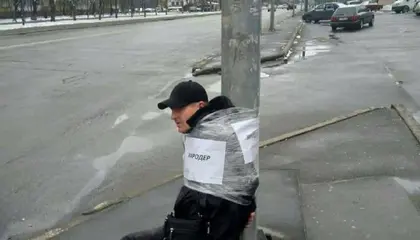Across the web, photographs have appeared of Ukrainian “marauders” (the preferred local term for looters) and those who fall foul of public norms, being punished by public humiliation.
This type of vigilante justice – rising in popularity despite being non-existent in Ukraine before Russia launched its full-scale invasion two months ago – is demonstrated by the hundreds of photographs, videos, and social media groups concerning this new form of “frontier justice.”
- View the most up-to-date Ukraine news articles published today.
- View the most up-to-date Ukraine news articles published today.
JOIN US ON TELEGRAM
Follow our coverage of the war on the @Kyivpost_official.
Hardly surprisingly, Russian fake news has sought to exploit this phenomenon as an example of the alleged “neo-Nazi” streak in Ukrainians.
So why, in fact, does it happen and what purpose does it serve?
“The public likes the idea of swift punishment that avoids languishing legal procedures,” says Vasyl Vovk, retired lawyer and major general of Ukraine’s State Security Service (SBU). “The publicity of the ‘punishment’ is very effective in preventing looting and other offenses.”
Though it has largely fallen by the wayside in Western countries, the use of corporal punishment has existed across the globe for thousands of years. Remnants of its legacy can still be found in the U.S., one of the few countries in the West that still allows for capital punishment, where it is not uncommon to hang the photographs of alleged shoplifters on a “wall of shame” at convenience store entrances.
Looting is known to break out during natural or manmade calamities when there is a perceived lack of government authority, leading some nefarious citizens to believe that socially undesirable behaviors, such as crime, are less likely to be caught and punished. However, even in such circumstances, the use of vigilante justice is no more legal than the crime of theft that it is seeking to punish.
“Of course, it’s not legal! We are not a backward republic! We are a democratic and lawful nation,” exclaims Vovk, to emphasize that vigilantism is absolutely not condoned by the Ukrainian Government.
He adds that “the police and courts are to make arrests and determine justice, not shop owners who could face violating Article 198 of the Criminal Code of Ukraine, and other statutes.” Moreover, “If moderate or serious harm is done to the health of the victim, these actions could trigger even further charges within the [code].”
During Russia’s initial occupation of the Donbas in 2014, cases of the Russian occupiers executing thieves was well documented in files that they had failed to destroy before fleeing back towards Russia.
Based upon a detailed review of dozens of videos of looters being caught, the majority of those roped to a pole had been stealing from local “mom-and-pop” stores. As Vovk states, most videos showed no sign that the police were involved nor that law enforcement was even aware that their local citizens had decided to mete out justice.
A few commonalities could be found in the videos that were reviewed. After having been caught breaking the law and then tied or taped to a pole, post, or other standing structure, the assailant was left to the gaze of the passing public.
However, a crook is tossing the dice of fate as to what additional punishments his fellow citizens may decide to sanction. Many videos show some marauders splashed with paint, while others have “thief” or a related term scrawled across their face and bodies. In a large number of cases, the accused are seen stripped of their shirts, and often left without clothes below the waist. In a few videos, locals can be seen kicking or striking the accused with a stick. However, for the most part, it seems as though the corporal punishment phase was brief and that the perpetrator was then left to his own devices to free himself.
“It varies,” says Vovk. “Some are punished and released. Some are taken away by relatives. Others are handed over to the police.”
Ukrainian police are currently charged with investigating the mass torture, rapes and murders that have occurred under Russian occupation, in addition to hunting for saboteurs seeking to destabilize Ukraine. As such, prosecuting either the thief who was caught, or the person who tied him to a post, is not a priority for the police says Vovk. “As a rule, cases of this kind do not reach the court: the police have enough work, and it is believed that the looters were adequately punished at the pole.”
You can also highlight the text and press Ctrl + Enter



